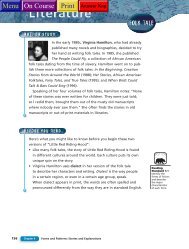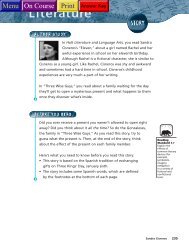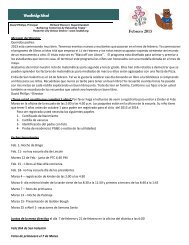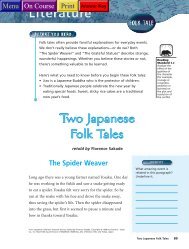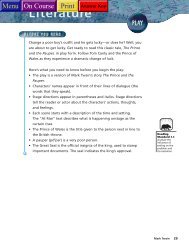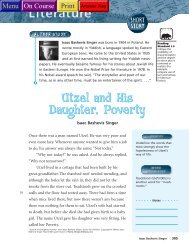A samurai is âone who serves.â In ancient times, the term described ...
A samurai is âone who serves.â In ancient times, the term described ...
A samurai is âone who serves.â In ancient times, the term described ...
Create successful ePaper yourself
Turn your PDF publications into a flip-book with our unique Google optimized e-Paper software.
Chapter 2<br />
Pupil Pages 56–97<br />
The Samurai <strong>In</strong>teractive Reading, page 83<br />
Go Beyond an <strong>In</strong>formational Text<br />
Research Template The <strong>samurai</strong> of long ago provide a fascinating<br />
topic for research. Use <strong>the</strong> template below to learn more about <strong>the</strong>se<br />
warriors of feudal Japan.<br />
Project Samurai<br />
Questions for Research Resource<br />
Who were <strong>the</strong> <strong>samurai</strong>?<br />
When did <strong>the</strong>y live?<br />
What was <strong>the</strong>ir purpose?<br />
Why were <strong>the</strong>y so feared?<br />
Why did <strong>the</strong>y cease to ex<strong>is</strong>t?<br />
88 Chapter 2 Characters: The People You’ll Meet<br />
Folk tales often provide fanciful explanations for everyday events.<br />
We don’t really believe <strong>the</strong>se explanations—or do we? Both<br />
“The Spider Weaver” and “The Grateful Statues” describe strange,<br />
wonderful happenings. Whe<strong>the</strong>r you believe <strong>the</strong>se stories or not,<br />
<strong>the</strong>re’s something valuable to be learned.<br />
Here’s what you need to know before you begin <strong>the</strong>se folk tales:<br />
• Jizo <strong>is</strong> a Japanese Buddha <strong>who</strong> <strong>is</strong> <strong>the</strong> protector of children.<br />
• Traditionally Japanese people celebrate <strong>the</strong> new year by<br />
eating special foods. Sweet, sticky rice cakes are a traditional<br />
new year’s food.<br />
Reading<br />
Standard 3.2<br />
Analyze <strong>the</strong><br />
effect of <strong>the</strong><br />
qualities of<br />
<strong>the</strong> character<br />
(for example,<br />
courage or<br />
cowardice,<br />
ambition or<br />
laziness) on<br />
<strong>the</strong> plot and<br />
resolution of<br />
<strong>the</strong> conflict.<br />
retold by Florence Sakade<br />
The Spider Weaver<br />
Long ago <strong>the</strong>re was a young farmer named Yosaku. One day<br />
he was working in <strong>the</strong> fields and saw a snake getting ready<br />
to eat a spider. Yosaku felt very sorry for <strong>the</strong> spider. So he<br />
ran at <strong>the</strong> snake with h<strong>is</strong> hoe and drove <strong>the</strong> snake away,<br />
thus saving <strong>the</strong> spider’s life. Then <strong>the</strong> spider d<strong>is</strong>appeared<br />
into <strong>the</strong> grass, but first it seemed to pause a minute and<br />
bow in thanks toward Yosaku.<br />
What amazing event <strong>is</strong><br />
related in th<strong>is</strong> paragraph?<br />
Underline it.<br />
The spider bows in<br />
thanks to Yosaku.<br />
From Japanese Children’s Favorite Stories, edited by Florence Sakade. Copyright © 1958 by Charles E. Tuttle<br />
Co., <strong>In</strong>c. Reprinted by perm<strong>is</strong>sion of Charles E. Tuttle Co., <strong>In</strong>c. of Boston, MA, and Tokyo, Japan.<br />
Two Japanese Folk Tales 89<br />
164 <strong>In</strong>teractive Reading: Teacher’s Edition



